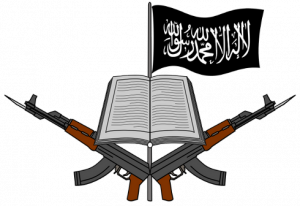African securityBoko Haram sending fighters to help ISIS in Libya: U.S.
U.S. officials said on Friday that there is evidence that Nigeria’s Boko Haram Islamists are sending fighters to join ISIS in Libya. This is only the latest manifestation of the growing cooperation between the two groups. Nigeria has been asking the United States for military gear, including aircraft, to fight Boko Haram. Congress, however, has restricted the sale of U.S. military equipment to Nigeria because of rampant corruption in the Nigerian armed forces and government, and because the Nigerian military has been engaged in systematic violations of basic human rights of Nigerian civilians.

Logo of Boko Haram // Source: commons.wikimedia.org
U.S. officials said on Friday that there is evidence that Nigeria’s Boko Haram Islamists are sending fighters to join ISIS in Libya. This is only the latest manifestation of the growing cooperation between the two groups.
The Telegraph reports that Nigeria has been asking the United States for military gear, including aircraft, to fight Boko Haram. Congress, however, has restricted the sale of U.S. military equipment to Nigeria because of rampant corruption in the Nigerian armed forces and government, and because the Nigerian military has been engaged in systematic violations of basic human rights of Nigerian civilians.
The scope of the cooperation between ISIS and Boko Haram is not known, but Western governments have been worried for some time about ISIS’s growing sway in north Africa. Growing cooperation between ISIS and Boko Haram could lead to the jihadists pushing south from Libya into the vast, ungovernable Sahel region.
The Telegraph quotes U.S. deputy secretary of state Antony Blinken who said that there were “reports” Boko Haram fighters were going to Libya, where ISIS now has about 6,000 fighters.
“We’ve seen that Boko Haram’s ability to communicate has become more effective. They seem to have benefited from assistance from Daesh,” he said, using the Arabic acronyms for ISIS. There were also reports of material and logistical aid.
“So these are all elements that suggests that there are more contacts and more cooperation, and this is again something that we are looking at very carefully because we want to cut it off,” Blinken told reporters in Nigeria.
Blinken said the United States was helping Nigeria in its fight against Boko Haram with armored vehicles, but he refused to comment on Nigeria’s request for U.S. aircraft.
Earlier this month U.S. officials said that the administration is considering selling twelve A-29 Super Tucano light attack aircraft to Nigeria, but Congress would need to approve the sale.
Blinken said Nigeria made several requests for military hardware. “We are looking very actively at these requests,” he said.
Nigeria’s foreign minister Geoffrey Onyeama said that the Buhari government had established reporting mechanisms inside the military to prevent human rights violation, and he said he hoped these mechanisms whould convince Congress to approve the sale.
Blinken said the military under Buhari had made “important efforts” to address human rights but that the United States was “troubled” by an Amnesty International report last week which documented the death of children in military detention.
Blinken said the United States was also concerned about the Nigerian army’s massacre of hundreds of Shi’ites in northern Nigeria in December.
He said a state commission to investigate the killings should provide a “transparent and credible report.”
